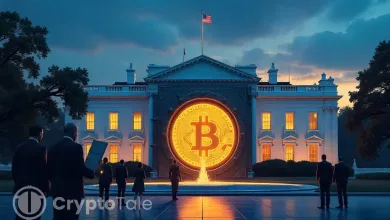U.S. Debt Woes Could Boost Bitcoin’s Rise as Global Reserve

- Brian Armstrong warns U.S. debt could push Bitcoin to replace the dollar globally.
- Elon Musk blasts spending bill, calling it “pork-filled” and a fiscal disaster.
- Rising debt and inflation fears fuel Bitcoin’s growing appeal as a global reserve.
America’s rising debt is causing concern among crypto leaders. Coinbase CEO Brian Armstrong recently warned of major consequences ahead. Armstrong posted on X about the growing $37 trillion U.S. national debt. He said if Congress fails to act, Bitcoin may take over as the global reserve currency.
“I love Bitcoin, but a strong America is also super important,” Armstrong stated. “We need to get our finances under control.”
His comments came as lawmakers face criticism over new spending. The House recently passed a bill that could add more debt. Backed by President Donald Trump, the bill extends tax cuts and boosts defense spending. It also reduces funds for clean energy, food aid, and Medicaid programs.
Armstrong’s warning echoed rising fears about the U.S. dollar’s future role in the global economy. He said that without serious reforms, Bitcoin might replace it.
Elon Musk also criticized the bill. The Tesla CEO and former head of D.O.G.E. called it “outrageous” and “pork-filled.” Musk added that the bill was a “disgusting abomination,” showing his disapproval of Congress’s fiscal direction.
Bitcoin was created in 2008 as a response to the financial instability of the time. Its fixed supply and resistance to inflation make it attractive during uncertain times. Supporters say Bitcoin offers protection when national currencies lose value. As debt rises, so does interest in alternatives like Bitcoin. Institutional investors have shown growing support for Bitcoin. Some U.S. states are also adopting crypto for payments and reserves.
Armstrong’s statement gained traction as political tensions grew. Many Americans are concerned about rising inflation, spending, and long-term financial risks. Elon Musk acknowledged Armstrong’s concerns. His public agreement signals that top business leaders are closely watching U.S. economic policy.
Related: Bitcoin’s Rally Ends as Market Reacts to Trade Tensions
The situation is not just domestic. Other nations are also reevaluating their reliance on the U.S. dollar. Some countries have already begun reducing reliance on the U.S. dollar by exploring other currencies and Bitcoin for trade. For instance, El Salvador became the first country to adopt Bitcoin as legal tender in 2021, using it alongside the U.S. dollar.
Armstrong warned that continued inaction may accelerate that global shift. He urged voters to hold lawmakers accountable for reducing the deficit. Bitcoin’s potential as a reserve currency is now part of a serious financial debate. Its role could grow as U.S. debt expands.
Congress has yet to address the long-term impact of the current bill. The Senate will decide the next steps in the coming weeks. For now, Bitcoin’s appeal only seems to be growing.




